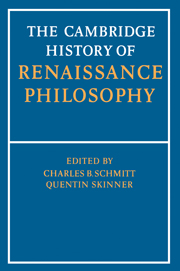Book contents
- Frontmatter
- Introduction
- PART 1 THE INTELLECTUAL CONTEXT
- PART 2 PHILOSOPHY AND ITS PARTS
- 6 Logic and language: Traditional logic
- 7 Logic and language: Humanistic logic
- 8 Natural philosophy: Traditional natural philosophy
- 9 Natural philosophy: The new Philosophy of nature
- 10 Natural philosophy: Astrology and magic
- 11 Moral philosophy
- 12 Political philosophy
- 13 Psychology: The concept of psychology
- 14 Psychology: The organic soul
- 15 Psychology: The intellective soul
- 16 Metaphysics
- 17 Problems of knowledge and action: Fate, fortune, providence and human freedom
- 18 Problems of knowledge and action: Theories of knowledge
- 19 Problems of knowledge and action: Epistemology of the sciences
- 20 Philosophy and humanistic disciplines: Rhetoric and poetics
- 21 Philosophy and humanistic disciplines: The theory of history
- PART 3 SUPPLEMENTARY MATERIAL
- Biobibliographies
- Bibliography
- Index nominun
- Index rerum
- References
17 - Problems of knowledge and action: Fate, fortune, providence and human freedom
from PART 2 - PHILOSOPHY AND ITS PARTS
Published online by Cambridge University Press: 28 March 2008
- Frontmatter
- Introduction
- PART 1 THE INTELLECTUAL CONTEXT
- PART 2 PHILOSOPHY AND ITS PARTS
- 6 Logic and language: Traditional logic
- 7 Logic and language: Humanistic logic
- 8 Natural philosophy: Traditional natural philosophy
- 9 Natural philosophy: The new Philosophy of nature
- 10 Natural philosophy: Astrology and magic
- 11 Moral philosophy
- 12 Political philosophy
- 13 Psychology: The concept of psychology
- 14 Psychology: The organic soul
- 15 Psychology: The intellective soul
- 16 Metaphysics
- 17 Problems of knowledge and action: Fate, fortune, providence and human freedom
- 18 Problems of knowledge and action: Theories of knowledge
- 19 Problems of knowledge and action: Epistemology of the sciences
- 20 Philosophy and humanistic disciplines: Rhetoric and poetics
- 21 Philosophy and humanistic disciplines: The theory of history
- PART 3 SUPPLEMENTARY MATERIAL
- Biobibliographies
- Bibliography
- Index nominun
- Index rerum
- References
Summary
These concepts constitute one of the fundamental philosophical problems about human destiny in general and about human actions in particular. Is the individual a rigidly defined link in a universal chain of being in which birth, life and death have been entirely preordained by physical cosmic forces? Or can the individual control his life and, by means of more or less independent decisions, direct it to some consciously chosen goal? Such questions are as old as humanity itself. Sometimes they are coloured by religious beliefs or magical and astrological superstitions and scarcely emerge into popular awareness. At other times they stimulate the philosophical reflections which are humanity's first steps away from a dark and fearful fate towards a rational understanding of natural and historical events.
THE PROBLEM IN ANTIQUITY AND THE MIDDLE AGES
In antiquity philosophy could not entirely disburden itself of ειμαρμενη the mysterious fate which ruled men and gods, impervious to protests and invocations. Except for thinkers like Plato, Aristotle and Plotinus, who achieved a profound and rigorous grasp of the first principle, the bulk of Greek, Hellenistic and Roman thought tended to be drawn by its monistic and materialist metaphysics into a kind of cosmic necessity which denied human freedom and excluded providence (πρóνοια) and the contingency of events (τυχη). The first centuries of the Christian era teemed with tracts about fate. One current was represented by Alexander of Aphrodisias, who, following Aristotle, asserted the possibility of contingency, that is, ενδεχóμενον By contrast, evolving Neoplatonism petrified the causal links between the degrees of being, thus unleashing a frenzy of magical-mystical practices which profoundly affected the purity of man's religious relationship with the divine.
- Type
- Chapter
- Information
- The Cambridge History of Renaissance Philosophy , pp. 639 - 667Publisher: Cambridge University PressPrint publication year: 1988
References
- 3
- Cited by



